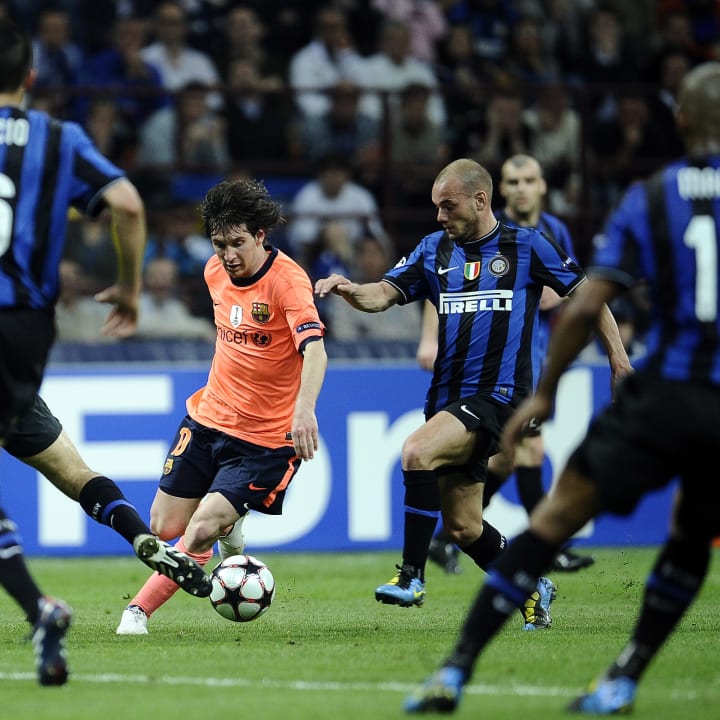
Remembering Lionel Messi’s controversial 2010 Ballon d’Or win
The sight of Lionel Messi holding the Ballon d’Or trophy aloft is a pretty common one these days.
The Barcelona man has won the award six times, more than anyone in history, and there’s a good chance he’ll add to that tally before he eventually hangs up his boots. After all, he’s pretty good at football.
Most of his victories are undisputable. He’s one of the greatest in the history of the sport, but one of his Ballon d’Or triumphs sticks out like a sore thumb, and that was back in 2010.
This was Messi’s second Ballon d’Or award, and it’s not as if he didn’t deserve it. He scored 60 goals in all competitions for club and country in 2010, leading Barcelona to success in La Liga and the Spanish Super Cup. Decent.
But there were two players who deserved it more. World Cup winner Andres Iniesta was many fans‘ favourite, but Inter playmaker Wesley Sneijder was as close to a sure thing as you’re ever likely to find.
Now, to be more deserving of individual success than a player who scored 60 goals in all competitions would take some doing, and yet Iniesta and Sneijder both had strong cases as to why they should have been the ones lifting the prize.
For Iniesta, his main claim came from the fact he scored the winning goal in the 2010 World Cup final. That’s an accomplishment which would have usually won you the award in any other World Cup year, but the goalposts were shifted this time around.
However, it’s Sneijder who felt most aggrieved. The Dutchman had one of the most outstanding individual campaigns we’ve ever seen, and while he didn’t end 2010 with 60 goals, he did end it with five trophies and a runners-up medal at the World Cup.
Sneijder was the creative hub at the heart of Jose Mourinho’s Inter side who took the world by storm in 2009/10. I Nerazzurri won Serie A, the Coppa Italia and the Champions League, and while many will point to Diego Milito’s goals as a reason for that, anyone who watched Inter that year will admit that it was Sneijder who pulled the strings.
En route to that Champions League victory, Sneijder’s Inter actually knocked out Barcelona, with Sneijder himself grabbing a goal and an assist in the 3-1 win at San Siro which ultimately decided the winner of the semi-final.
You’d think that would be enough to earn Sneijder the prize, but if you need a little more, he also scored five goals to steer the Netherlands to the World Cup final, winning the competition’s Silver Ball in the process.
He lost out to Uruguayan Diego Forlan, who perfected the ability to break the laws of physics by bagging screamer after screamer with the Jabulani ball that is infamous among goalkeepers. Forlan was superhuman that summer, and Sneijder was the only man capable of holding a candle to him.
Sneijder’s success was appreciated by the journalists who were invited to vote for the 2010 Ballon d’Or. He earned 293 points from that section of the votes, enough to put him top of the pile ahead of Iniesta (226), Xavi (229) and Messi (175).
In any year before 2010, that would have meant Sneijder won the award, but this was a special occasion as it was the first year in which the Ballon d’Or was taken over by FIFA, who invited players and managers to chip in as well.
What started off as a recognition of accomplishment quickly turned into a glorified popularity contest, with most of the new voters deciding that Messi, who admittedly was probably the best player on the planet at the time, deserved the award ahead of Sneijder.
Sure, Sneijder didn’t have the kind of otherworldly class that Messi possessed at the time, but that’s not the point. The award was supposed to honour the man who had enjoyed the best 2010, and ultimately, it didn’t.
To make matters worse, Sneijder didn’t even make the top three. Messi, Iniesta and Xavi stood on the podium, leaving the Dutchman without any form of recognition whatsoever.
Most frustrations weren’t at the fact that Messi had won the award, but rather that Sneijder hadn’t. FIFA’s system had cost him his chance at immortality, and 2010 is infamously remembered as the year that Sneijder was robbed.